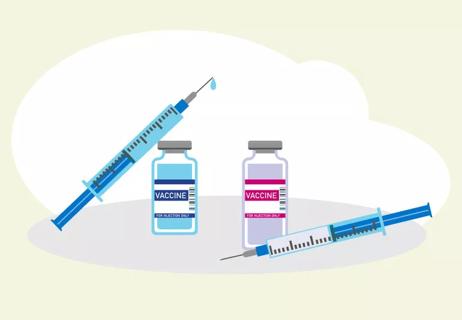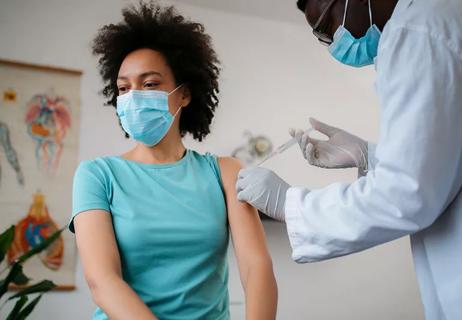They can stop an infection before it gets you sick or prevent you from becoming seriously sick

Vaccines have played a major role in public health for more than a century. And with good reason — vaccines save millions of lives each year from deadly diseases caused by viruses or bacteria.
Advertisement
Cleveland Clinic is a non-profit academic medical center. Advertising on our site helps support our mission. We do not endorse non-Cleveland Clinic products or services. Policy
“Diseases such as smallpox and polio that were killers a century or two ago are now barely blips in our conscience,” notes pulmonologist Daniel Culver, DO.
During the COVID-19 pandemic, the world watched vaccine development happen at unprecedented speed — a process that sparked both hope and debate. And there’s still a lot of confusion and debate around vaccines.
In addition to talking with your healthcare providers about what they recommend for you, Dr. Culver explains what you should know about how vaccines are developed and how they work.
You encounter thousands of germs every day. While your immune system can fight most of them on its own, vaccines help it fight the disease-causing ones (pathogens) it can’t handle.
So, what are vaccines made of?
The quick answer? Pathogens. Vaccines familiarize your immune system — which makes antibodies to defend your body against harmful invaders — with a certain pathogen so it’ll know what to do if you become infected with that pathogen in the future.
There are several different ways that vaccines can achieve this triggering of your immune system, Dr. Culver says. They contain either:
Advertisement
Vaccine ingredients may also contain adjuvants, which help boost your body’s immune response to the vaccine, and stabilizers, which keep the active ingredients working after the vaccine is made.
It’s important to note that vaccines don’t make you sick with the pathogen they’re designed to protect you from. Rather, they give your immune system a practice run at taking out a weaker, inactivated or partial version of the pathogen.
Very rarely, vaccines can cause severe physical reactions, but usually they’re mild — like some soreness where the vaccine was injected, a low-grade fever or achiness.
“This really means the immune system is sitting up and taking notice of the vaccine,” Dr. Culver explains.
In some cases, like with the MMR vaccine, you need more than one dose of a vaccine to build strong immunity. With others, like the tetanus vaccine, your immunity wears off over time and you need occasional “booster” vaccines.
In the case of the flu vaccine, the main targets of the immune response shift slightly from year to year, depending on which flu virus strains are circulating most that year, so you need a vaccine every year.
Most vaccines won’t prevent you from becoming infected with a certain pathogen. Rather, they allow your body to stop the infection before you get sick, or they prevent you from becoming seriously sick when you get infected.
Studies show that the flu shot reduces your risk of getting the flu by 40% to 60%. That might not seem like a lot, but studies also estimate that getting the flu vaccine makes you 82% less likely to be admitted to an intensive care unit with flu-related illness than someone who isn’t vaccinated.
This helps you, as well as those around you, including people in your community who can’t be vaccinated because of serious allergies or a medical condition that weakens their immune system. Pathogens can spread quickly from person to person. When a large number of people in a community are vaccinated, the pathogen can’t spread as easily.
“When more people in a community are protected, infections spread less easily — making outbreaks less severe,” Dr. Culver explains.
In the U.S., experts recommend that children be vaccinated against:
As an adult, experts recommend you have routine vaccines for:
Adults, ages 50 to 64, should also get the shingles vaccine.
Advertisement
Dr. Culver says you should talk to your healthcare provider about what vaccines are recommended for you. They welcome your questions and want to be sure you feel confident in your decision.
Like medicines, vaccines go through a long process of research, development and approval before they’re made available to the public.
“The usual timeline for developing vaccinations is certainly more than 10 years and probably closer to 15 or 20 years,” Dr. Culver says.
Vaccine development and vaccine testing starts in a lab, where scientists work to understand a pathogen and figure out how they could trigger the immune system to produce antibodies against it. When they identify a substance they think could work (an antigen), they start by testing it in cell cultures and then animals.
In the U.S., the sponsor of a new vaccine must submit an application to the U.S. Food and Drug Administration (FDA) before they can begin testing it in humans.
Vaccine developers must complete a three-phase clinical trial process to show that their product is safe and effective before it can be approved. This includes:
Advertisement
In the U.S., the FDA must also approve a new vaccine before it can be made available to the public.
“Regulators look at all the safety and effectiveness data collected from lab studies and clinical trials and then make a determination on whether or not this will be a product that actually will be helpful for the population,” Dr. Culver notes.
Once it’s approved, the vaccine then must be manufactured and distributed, which is a complex and time-consuming process. But not a lot of vaccines actually make it this far.
“Vaccines are very hard to develop,” he adds. “Sometimes, they may look very good in early-phase trials but then may not turn out to effective in phase 3 trials.”
If a vaccine is approved, regulators and drug companies continue to monitor its safety and effectiveness as more people take it.
We may all be used to getting the flu vaccine or taking our children for chickenpox shots, but newer vaccines like COVID-19 and RSV have been recently developed and approved by the FDA.
While the COVID vaccines moved through development at unusual speed, manufacturers and regulators said they combined steps to save time rather than eliminate them. This accelerated timeline remains a point of debate among medical experts and the public.
Advertisement
That doesn’t necessarily mean important steps were skipped along the way. The FDA granted manufacturers an Emergency Use Authorization (EAU), which helped speed up the process.
“The process of developing these vaccines was done very rigorously,” he says. “Many of these steps were just collapsed so they didn’t overlap.”
While you may have thought that respiratory syncytial virus, or RSV, is only prevalent in infants and children, anyone can get RSV.
In May 2023, the FDA approved an RSV vaccine to be given as a single shot in adults 60 years or older, with the goal of a fall 2023 rollout.
A trial shows the vaccine is 83% effective in preventing a lower respiratory tract disease, while data shows the vaccine is 94% effective at preventing severe disease that could lead to needing supplemental oxygen or a ventilator.
“Older adults sometimes develop severe complications of RSV. The recently approved vaccine markedly reduced the chances of developing symptoms from RSV in the lungs or severe complications of RSV infection such as pneumonia or hospitalization,” says Dr. Culver. “This is another step forward in broader protection of older adults from viral illnesses that can cause death.”
An RSV vaccine has also been approved for use in pregnancy, as has an RSV immunization for babies.
Overall, vaccines are vital to keeping us healthy and safe. And by understanding how vaccines are developed and how they work, it can help you separate fact from misinformation.
“Vaccines have been an important tool in reducing infectious diseases,” states Dr. Culver. “But like all medical choices, people weigh the benefits and risks with their healthcare provider.”

Sign up for our Health Essentials emails for expert guidance on nutrition, fitness, sleep, skin care and more.
Learn more about our editorial process.
Advertisement

Tetanus is easy to prevent but tough to treat — vaccines are your best defense

Older studies suggesting a link have been completely discredited — vaccinations are safe and effective

From influenza and COVID-19 to pneumococcal, shingles and more, vaccines help keep you healthy

Baby’s caregivers should be up-to-date on flu, COVID-19 and Tdap vaccines to protect the newborn in their lives

The answer varies from person to person and vaccine to vaccine

Getting routine vaccinations together can save you time and may be more effective

Previous vaccines against smallpox might provide some protection

Pain after a vaccine is normal — but here's how you can avoid it

The tropical fruit is a good source of antioxidants and vitamin C

Most people fall asleep within 10 to 20 minutes, but if your experience is different, adjusting your sleep schedule may help

Exploring your hidden side can lead to better understanding of what makes you tick